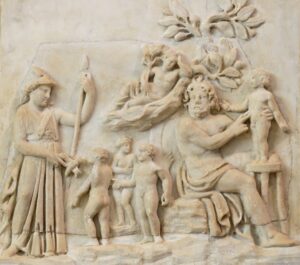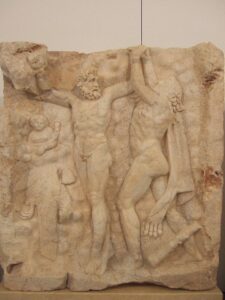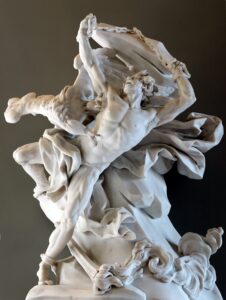


Prometheus is a prominent figure in Greek mythology, known for his intelligence and as a champion of humanity. He is often referred to as “Prometheus of the Caucasus” because of his punishment by Zeus, which took place in the Caucasus Mountains.
Origins and Family
Prometheus is a Titan, born to the Titan Iapetus and the Oceanid Clymene. He is often associated with foresight and crafty counsel, traits that set him apart from the other gods and Titans.
Role and Characteristics
Prometheus is best known for his role in the creation of mankind and his subsequent actions that led to his punishment:
- Creator of Humanity: Prometheus is credited with the creation of man from clay. His affection for his creations was greater than that for the Olympians, who had overthrown the Titans.
- Bearer of Fire: He is famously known for stealing fire from the gods and giving it to humanity, an act that enabled progress and civilization. Fire symbolizes knowledge and enlightenment in this context.
Punishment
As punishment for his theft, Zeus condemned Prometheus to eternal torment. He was chained to a rock in the Caucasus Mountains, where an eagle (or in some versions, a vulture) would eat his liver every day. His liver would regrow each night, only to be eaten again the next day. This punishment was meant to last forever, but he was eventually freed by the hero Hercules.
Symbolism and Legacy
Prometheus is often viewed as a symbol of resistance against tyranny and as a martyr for humanity. His story raises themes of suffering, endurance, and the human condition. In literature and art, Prometheus has been depicted as a figure of enlightenment and rebellion, inspiring works in various cultural contexts.
Prometheus’ story is a testament to the complexities of Greek mythology, where gods and mortals often interact in dramatic and morally intricate narratives. His legacy as a benefactor of mankind is a powerful narrative about the risks and rewards of challenging the divine order.